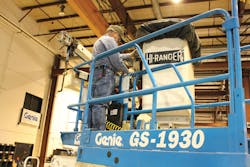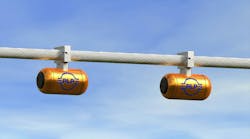When a severe storm strikes their service territory, linemen expect their vehicles to be in top performing condition. Otherwise, they could be stuck with a flat tire, engine problems or a burnt out headlight, which can hamper their ability to rapidly restore power to their customers.
For many utilities nationwide, preventive maintenance is key to keeping a fleet of aerial devices, digger derricks and cable placers running at peak efficiency. This is especially true in today’s economy, as the cost of buying new equipment compared to the cost of investing in preventive maintenance programs significantly impacts a company’s bottom line.
Implementing a preventive maintenance program for a utility’s fleet, based on the manufacturer’s recommended guidelines, can keep equipment costs low and uptime high.
Facing Challenges
While it’s essential for utilities to maintain their fleet, it can be challenging for smaller companies to have the time, resources and manpower to get the job done. For example, at the City of Troy Utilities, the electric department has 20 employees who are responsible for day-to-day maintenance, inspection and the repair of minor issues.
Each morning, the linemen and other field workers look over their trucks to make sure that nothing is broken, leaking or in need of a repair. During this inspection, the employees try to spot potential problems like faulty strobe lights, a flat tire or leaking engine oil. Oftentimes, these issues need to be resolved before the workers head out for the day’s work. If the truck is not able to be used for the day, then it is flagged and set aside for repair.
While the workers are experienced linemen, groundmen and equipment operators, they are not trained mechanics. As such, they often are not able to identify and repair major problems with the fleet.
Over time, trucks have gotten more technologically advanced, making it harder for the field workforce to maintain. Today’s fleet now includes LED lights and the latest technology to monitor emissions and fuel economy. While these advancements have made the fleet more efficient and easier to operate, at the same time, it has made even simple repairs more complicated.
Long gone are the days when a lineman could fix just about anything wrong with a truck with a few hand tools. In the past, the field workforce could fix such problems as hydraulic hoses and engine components. Today’s mechanics, however, rely on a computer and detailed technical knowledge to work on a truck’s hydraulic and electrical systems.
Outsourcing Fleet Maintenance
With no in-house mechanics and no fleet maintenance facility, it can be difficult for the utility to make major repairs quickly. For many years, the City of Troy has worked with a local garage for oil changes and small repairs. When vehicles break down on the job site, however, it can be a challenge to get the heavy equipment up and running in a timely manner.
To efficiently serve its 8,000 electric customers in Troy, Alabama, the utility opted to enter into a service agreement with its truck manufacturer, Terex Utilities. Currently, the utility operates eight aerial bucket trucks/digger derricks and several pickups, flat-bed trucks and other equipment.
Because the account manager and two mechanics work within the utility’s service territory, the City of Troy can work with them directly. If they face a problem, a Terex mechanic is usually on site that day or the next day.
Rather than having to remember to call Terex and schedule an appointment, the vendor sends mechanics to inspect the trucks on a routine basis, provide specialty maintenance and identify problems. Often, they are able to work around the utility’s schedule.
Having the mechanics close by can be an advantage, especially when a vehicle breaks down on the job site. In those situations, a mechanic often will make it a top priority to provide same-day service. If they come out to the job site to repair the truck, it’s usually because of a serious mechanical issue like a major leak or a boom that can’t be stowed. The mechanics treat these problems as an emergency and go out of their way to fix them as quickly as they can.
In other cases, in which the trucks simply need to be inspected and maintained, the mechanics can work the inspections around the utility’s schedule. For example, they may come in and do an inspection before they start work, after they end for the day or over the weekend. That way, they don’t have to be one truck short during a busy work day. Because they are a trusted partner, the city has supplied them with a gate key, so that they can make the repairs off-hours when it is at the most little inconvenience possible.
Two mechanics service the area, and because they live within a reasonable driving distance, they can drive to the city’s service center to perform a diagnostic evaluation and repairs.
Getting Quarterly Service
With the service agreement, the City of Troy is able to get its trucks serviced on a more constant basis. A mechanic and the accounts manager looked into the program a few years ago. As part of this evaluation, they looked at the prices, labor and materials, and travel charges. By going with a preventive maintenance program, they were actually able to save money as opposed to having the vendor come out less frequently to inspect the fleet.
Having a formal service program has allowed the city to budget more accurately for inspections, and it has enabled the Terex mechanics to catch problems while they are still relatively minor. In the past, Terex may have seen the fleet every six months or year. The city would call upon the vendor only when something major was broken or damaged, and while the mechanics were on site, they would fix any other problems that they identified.
Today, the mechanics visit the City of Troy’s headquarters quarterly, and sometimes more frequently, which helps the mechanics to stay on top of any issues with the trucks. That way, they can resolve them before they turn into a more expensive problem or a dangerous issue that could compromise the safety of the driver.
Every 90 days, the company sits down with the utility to discuss their needs. They start by identifying what equipment they have and review the maintenance guidelines for those trucks. Then, they talk about what tasks their in-house crews can handle and which tasks could be handled by a technician. During this consultation, the utility considers the costs associated with outsourced service in the last year, including labor and travel, and works to build a customized service program.
As part of this partnership, the service program addresses all the points in a maintenance program, documents all maintenance activity and anticipates future needs including parts orders, warranty work, compliance with industry standards and required manufacturer service updates, as well as emergency service needs and the impact of adding new trucks to the fleet.
So far, the service agreement has been cost effective for the City of Troy. Its linemen can focus on what they do best — maintaining high-voltage power lines — rather than trying to do the work of a mechanic. While it seemed like more money upfront, in the long run, it has saved the city a significant amount by increasing the availability of the fleet during repairs. The service programs enable the utility to plan out the fleet’s maintenance needs for the entire year, giving them the opportunity to better plan for downtime and to allocate costs against its equipment budget.
With a small team, the city needs to have its linemen out in the field working and not back at the service center waiting on their trucks to be fixed. By partnering with the vendor, the city has found a partner that has the expertise to find and fix problems on a regular basis. As a result, the linemen can be more productive and safer out on the road.
Whether a utility uses in-house resources or outsources this work to another company, it’s important to invest in a preventive maintenance program. That way, utilities can maximize the life of their trucks and keep the fleet up and running for a long time.
Brian Chandler ([email protected]) is the electric superintendent for the City of Troy, Alabama, responsible for engineering system operations, safety vehicle acquisition, and overseeing maintenance and construction. Chandler has been working in the power industry since 1997, when he graduated with a bachelor’s degree in electrical engineering. Since that time, he has worked in line work, safety, administration, and purchasing and warehousing.
Sidebar: Six Tips for Fleet Maintenance
Preventive maintenance can make the difference between a smoothly operating fleet and one that is constantly dealing with downtime. Here are six tips on how to keep your linemen and your vehicles ready for any event.
1. Develop a maintenance program and stick to it. Any truck manufacturer will have a suggested maintenance schedule for its vehicles. Utilities should develop a maintenance program based on the manufacturer’s recommendations and then customize it to fit their working schedule. In addition, maintenance tasks should be completed at regular intervals in the truck’s life cycle.
2. Perform a visual inspection of all the truck’s main systems daily. Daily maintenance tasks include a visual inspection of all the truck’s main systems as well as an operational test of all the truck’s main functions. The best people to complete the daily maintenance tasks are the truck’s operating crew because they know the most about the truck’s particular sounds and performance.
3. Make immediate repairs. If any components or functions of the truck are not working properly, then these items need to be brought to the attention of a trained service technician or mechanic and be immediately repaired or replaced to ensure the safety and productivity of the truck and its crew. It’s often easier to deal with small issues rather than wait to have a component fail and then face the consequences.
4. Keep the lines of communication open. Maintenance intervals are often suitable opportunities for the truck’s operating crew and the company’s service technician or mechanic to have an open discussion about how the truck is being used, the conditions it’s operating in and how it’s performing.
For example, if the truck is being operated in adverse conditions, such as in extreme hot or cold temperatures, a utility company’s service team needs to be aware of them. Specific maintenance tasks must be done to keep the truck performing in these conditions over time.
5. Do inspections annually. A utility company’s maintenance program also should include a complete “once-over” check of the truck’s components and functions. Because ANSI prescribes the dielectric integrity of a utility truck’s boom must be tested every year, this is a good time to take care of two important maintenance tasks at one time, reducing downtime and minimizing costs. During the annual inspection, everyone involved in the truck’s operation and care needs to look at the truck’s maintenance records to spot any patterns.
6. Consider outsourcing fleet maintenance. If a utility truck has any issue that cannot be fixed by the company’s in-house service crew, additional trained technicians or mechanics need to be involved. Utilities should have a strong relationship with their equipment distributor and the equipment manufacturer as another resource to help them maintain their utility fleet. Utility companies may chose to outsource their fleet maintenance for many reasons, including to take advantage of another’s expertise in the equipment, specialized mechanic skills, parts ordering, warranty repairs and documentation of work done.
Companies mentioned:
City of Troy Utilities | www.troyal.gov
Terex Utilities | www.terex.com/utilities




